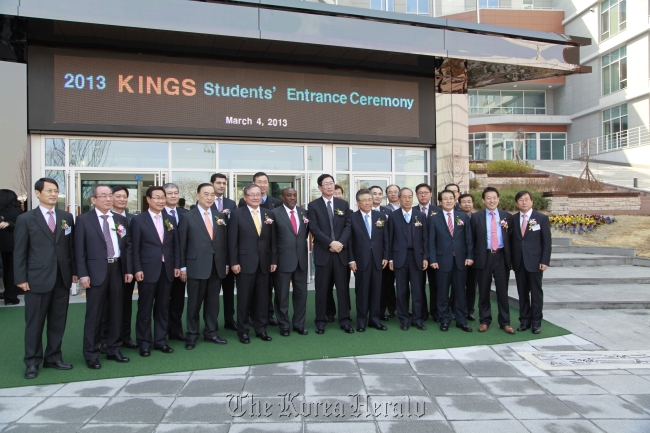Korea and Kenya forged ahead with plans to build a nuclear power plant and make the East African nation the second to have nuclear power on the continent.
Kenyan Ambassador to Korea Ngovi Kitau participated in a ceremony lauding the 2013 incoming class of Kenyan nuclear engineers and other professionals on March 4 at KEPCO’s school for nuclear power professionals in Ulsan.
Kenyan-Korean cooperation on development in the East African country has led to the opening of this new school to train future nuclear engineers, the KEPCO International Nuclear Graduate School (KINGS). There are currently 54 students enrolled in KINGS, including 22 international students, half of whom are from Kenya.
 |
Kenyan Ambassador to Korea Ngovi Kitau (center) is joined by academic and government officials in a group photo during a ceremony lauding the incoming class of KEPCO’s school for nuclear power professionals in Ulsan on March 4. (Kenyan Embassy) |
Last year, six students from Kenya were admitted: two to study power generation, two for power transmission, and two for radiation safety. Five more students were admitted this year.
Some 300 more nuclear power plants will be built worldwide by 2030, KINGS forecast on its website.
This surge in nuclear power will bring greater demands for many more engineers, scientists, technicians and other nuclear power professionals. The school estimates that, in fact, about 100,000 more nuclear engineers and 10,000 other leadership-level nuclear experts will be required in the near future.
The World Nuclear Association estimates about 45 nations around the world are “actively considering embarking on nuclear power programs.” Of the 45, 12 are from Africa.
Kenya has advanced furthest in its plans to generate electricity from nuclear power, with a 1,000-megawatt reactor planned for 2022.
“Kenya now has 11 students undertaking master’s courses in nuclear engineering in preparation for 2022, when Kenya will start using nuclear energy,” said Kitau.
Last year’s six were from different institutions, namely: Kenya Nuclear Energy Board, Kenya Power and Lighting Company, and Kenya Radiation Protection Board. Kitau said the two countries are currently discussing admitting two additional students into KINGS.
By Philip Iglauer (
ephilip2011@heraldcorp.com)








